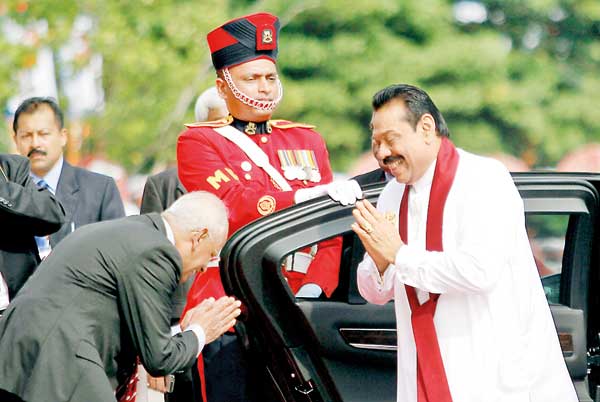Lalith Weeratunge; The Purohithayā
By Rajiva Wijesinha -
Enemies of the President’s Promise – Doc 1
On the old Bibilical adage that, from him to whom much is given, much is expected, the most reprehensible of those on whom the President relied was his Secretary, Lalith Weeratunge. But in addition to his undoubted intelligence and administrative abilities, there was another factor which led to high expectations. This was that, whereas all the others whose influence has been described were exercising this to fulfil their own agendas, with Lalith it was never doubted that he saw himself as only serving the purposes of the President.
An exception could be made with regard to the Secretary of Defence, in that it could be argued his agenda was not intended for his own benefit, as opposed to the other five whose ambitions have been noted. But increasingly during the President’s second term in office Gotabaya Rajapaksa began to see himself as fulfilling a purpose, albeit idealistic, that was at odds with what his brother intended. It was almost as though, having previously claimed that he could win the war but the political solution had to come from elsewhere, he had begun to think that his role was crucial for any acceptable political settlement. So he even directly criticized his brother, for instance by arguing that Northern Provincial Council elections should not be held, or by allowing crude attacks on the Lessons Learnt and Reconciliation Commission on the Defence Ministry website.
Lalith was different, in that he did not think the President’s essential vision was at fault. Indeed the closest he got to criticism was to declare that those around the President concealed from him what was really happening. His claim then was that he kept his ear to the ground and knew what the real situation was. But, though his primary allegiance to the President was never then in doubt, he too unfortunately failed to provide advice and assistance that would enable the President to pursue the objectives he had outlined in his manifesto, or to fulfil the commitments he had made with regard to pursuing a pluralistic political solution.
 Thus for instance, he remained passive when the President failed to fulfil his promised to change the Chief Secretary of the Northern Province after the Provincial Council election in which the TNA had won a massive majority, towards the end of 2013. The TNA provocatively and unnecessarily passed a motion in the Council to the effect that the Governor, former General G A Chandrasiri, should be removed. But in conversation with the President the moderate Chief Minister, C V Wigneswaran, a former Justice of the Supreme Court, accepted that this could not be done immediately. It was agreed then that the President would make a change in that respect when Chandrasiri’s current term ended, in July 2014. However he agreed that the Chief Secretary, who had made it clear that her allegiance was to the Governor, rather than the elected Board of Ministers (on whose advice the Governor was meant to act) would be changed at once.
Thus for instance, he remained passive when the President failed to fulfil his promised to change the Chief Secretary of the Northern Province after the Provincial Council election in which the TNA had won a massive majority, towards the end of 2013. The TNA provocatively and unnecessarily passed a motion in the Council to the effect that the Governor, former General G A Chandrasiri, should be removed. But in conversation with the President the moderate Chief Minister, C V Wigneswaran, a former Justice of the Supreme Court, accepted that this could not be done immediately. It was agreed then that the President would make a change in that respect when Chandrasiri’s current term ended, in July 2014. However he agreed that the Chief Secretary, who had made it clear that her allegiance was to the Governor, rather than the elected Board of Ministers (on whose advice the Governor was meant to act) would be changed at once.
Lalith was instructed to make the change, and this mark of a willingness to compromise was conveyed to diplomats who had been positive about Sri Lanka. They felt betrayed then when action was not taken, and all Lalith could say in excuse was that his hands were tied. Even if this meant that the President had changed his mind, it was incumbent on Lalith to point out to the President the negative consequences of what would seem duplicity, and urge at least a further discussion with the Chief Minister. But nothing of the sort happened. Typically, in July 2014, General Chandrasiri was reappointed Governor for a further five year term.
Another earlier example of Lalith’s passivity, more reprehensible perhaps because it was with regard to a matter that was not contentious, was his failure to move on the President’s commitment to introducing a Second Chamber of Parliament. This had been a key feature of the Liberal Party’s proposals for Constitutional Reform, but I had found that the All Party Representatives’ Committee that met in my office when I was Head of the Peace Secretariat was not at all interested in the idea. The APRC was chaired by Prof Tissa Vitarana, of the old Trotskyist Party, the LSSP, and they looked on the concept in the light of their scorn for the British House of Lords.
In all fairness too the Sri Lankan Senate, that had been abolished by the 1970 SLFP led government in which the Trotskyists were in charge of Constitutional Reform, had been a fairly useless institution. Half of it was chosen by the Prime Minister of the day, and the other half was based on numbers in the House of Representatives, so it was virtually a rubber stamp. Though there were a few exceptional individuals, generally its membership consisted of those being rewarded for service to the party in power, and few of these had the capacity to conceptualize, or to analyse and improve legislation.
The President however had seized on the idea when I mentioned it, and included it in his manifesto. But there was no one with specific responsibility for Constitutional Reform in the 2010 government and the idea lay forgotten. Significantly, the Japanese Ambassador, who was deeply committed to assisting Sri Lanka, asked me after a few months why there had been no progress at all on reforms, and suggested that even instituting a Senate based on provinces would help to make it clear that government was committed to a pluralistic political solution.
I mentioned this to the President, and he asked Lalith why they had not proceeded with the proposal. We discussed it further, and he even suggested numbers, with a basis of equality for all provinces. But, though Lalith nodded sagely and took down notes, that was the end of the matter.
I did not think at the time that he had deliberately ignored the President, but put it down rather to slowness. Having worked together with Lalith in the Ministry of Education some years back, and found him very able, perhaps I was too indulgent to him in the years that followed. My own view was that he was grossly overworked, and I did say this once to the President, and suggested he should take on more staff if he wanted things to move. But his response was that Lalith held everything closely to himself, and refused to delegate.
This I came to realize was true, but it was also true that Lalith was overwhelmed with tasks that were quite unnecessary. We used to meet occasionally during the first few years of the 2010 government, and I told him once that I thought he wasted a lot of time going with the President to various meetings, openings of roads, award ceremonies, functions at temples and so on. That did not seem to me the job of the President’s official Secretary, and he agreed, and said he had decided to refrain from such in the future.
But needless to say, there he was again over the next few days featured in the newspapers as a constant presence by the President’s side at all functions. I teased him about this when we next met, and he told me that the problem was, the President insisted he attend. And I could understand this, for the reason that the President too realized that Lalith was the only person he could trust absolutely, whose involvement in public life was simply to help the President pursue his own political agenda. He was in effect the purohithaya, the trusted confidante of the King in ancient history, and the ruler, knowing he was surrounded by many who only wanted to take advantage of him, needed this principal acolyte at his side on all occasions.
But that, as it became clear from his absolute refusal to rock the boat when it was in the President’s interests, was not his only reason for clinging close. The fact was that he also enjoyed the position he held, and that he wanted to keep it, which meant he had to be wary about efforts to undermine him. But in giving in to his worries on this score, he failed to take advantage of the positive qualities which had brought him to this position and indicated the President’s appreciation of the importance of having a good secretary.
Unlike his predecessor, he was a professional public servant, and one of the best of them, which meant Mahinda Rajapaksa would have found it difficult to replace him. In this Lalith shared the general respect which Premadasa’s Secretary, K H J Wijeyadasa, had commanded, unlike the Secretaries to both President Jayewardene and President Kumaratunga. Both of them had selected individuals who were distinguished only for the personal service they had rendered them in previous secretarial positions, and the result was a complete lack of professionalism – and, sadly, rent seeking, in that both of them had offspring who engaged in arms dealing and were able through the influence of their parents to win lucrative contracts.
Lalith was head and shoulders above such characters, but this was not true of many others who worked for President Rajapaksa, and he therefore had to compete against those whose professional commitment and understanding were minimal. And he had to face constant challenges to his position, not only from others in administrative positions, but also from Ministers. Thus soon after I had entered public life I found that Lalith thought he was under attack from the Foreign Minister, and he confided as much in Dayan Jayatilleka who was then our ambassador in Geneva. Dayan did not see eye to eye with the then Minister Rohitha Bogollagama, and perhaps Lalith thought Dayan would be sympathetic, but the email in which he expressed his worries indicated deep distress.
Early in the life of the 2010 government Lalith faced a greater challenge, when his wife, Indrani Sugathadasa, fell out with a coterie close to the President. This occurred because she, a senior public servant in her own right, had been made Chair of the Security Exchanges Commission, but found that there were blatant instances of Stock Market manipulation. Having tried to put a stop to this and failed, she wanted to resign, but, as Lalith put it, had asked him whether this might embarrass him.
Lalith had told her to do what seemed best to her, and she resigned, but those who resented her probity would doubtless have held this against Lalith. Certainly he seems to have been even less inclined from then on to stick his neck out, or to take any initiatives of his own.




